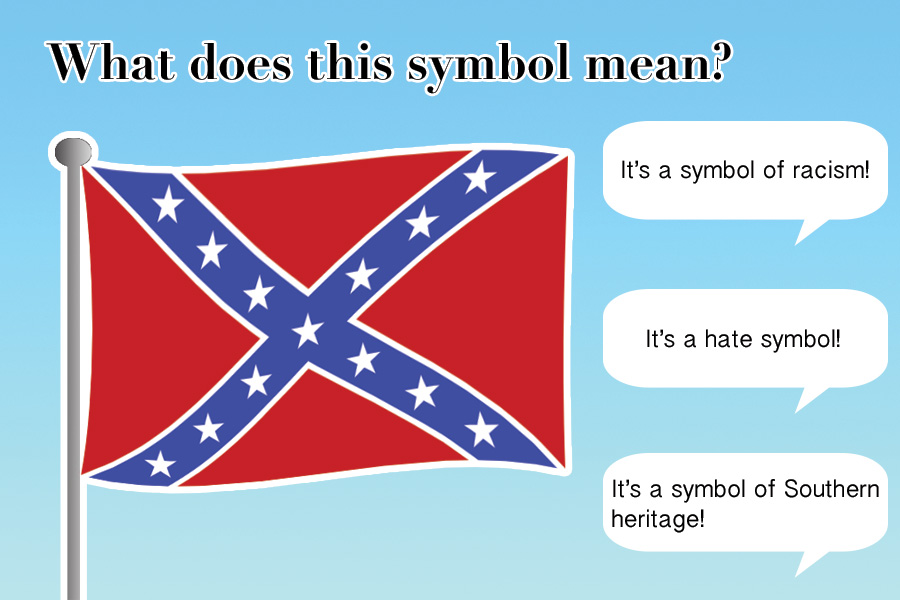Safeguarding freedom of expression is essential

It took an act of violence and nine lost lives to reignite a debate that continues to divide the nation into various shades of red, white and blue.
Confederate symbols, which have been linked to our nation’s dark past and current acts of violence, are gradually being removed from public view.
The voluntary removal of Confederate flags, statues and products from buildings and store shelves should be applauded. However, there is a risk of silencing a form of free speech that makes how we go about creating this change as important as the change itself.
Our First Amendment grants all individuals the right to free expression, even if the resulting speech is deemed offensive or hateful. While one’s beliefs may bring about strong opposition, any violent offenses stemming from such beliefs are illegal.
For example, on June 17, alleged shooter Dylann Roof, a 21-year-old white male, opened fire inside the Emanuel African Methodist Episcopal Church in Charleston, S.C. This tragedy claimed the lives of innocent African-American churchgoers, and brought back to the forefront the issue of race relations.
News reports indicate Roof told authorities he wanted “to start a race war.” Roof also told police that he “almost didn’t go through with it because everyone was so nice to him.” In the end, he decided to “go through with his mission.”
In the days following the shooting, photos and writings of Roof’s admiration of the Confederate flag began to surface. It became evident Roof’s intentions, in regard to the massacre, were fueled by the racist ideals he associated with Confederate symbols.
Roof’s usage of the Confederate flag aligns with its connotations of slavery and racial prejudice, which has divided this country for generations. While his belief is legally protected by a Supreme Court decision, R.A.V. v. City of St. Paul, his criminal actions are not.
Scattered throughout recent history, there have been numerous acts of violence seemingly brought on by escalating racial tensions. In many of these incidences, the Confederate flag serves as a current symbol for white supremacy groups based on its historical background.
During the Civil War, the flag was used to spotlight Southern rebellion. Having formed the Confederate States of America in 1861, the South went to war against the Union of the North because of disagreements over states’ rights – with slavery a key issue.
While the iconic red, white and blue colors of the Confederate flag echoes that of the American flag, the symbolism projected from one is significantly separate from the other.
For some, the Confederate flag represents Southern pride and remembrance of the historic battles veterans fought against the Union from 1861 to 1865. To this particular portion of the population, there is a sense of connection to their heritage found within the symbol.
For others, the flag is symbolic of the subjugation of one race as inferior to another. The racial discrimination and unsavory history of America’s past has been personified through the flag’s symbolism.
So, whose opinions and perspectives on the flag are most valid? Does it symbolize Southern pride, racial inequality or is it simply a historical marker?
Perhaps the truth is in the eye of the beholder, as symbols signify an array of meanings to each individual person. Regardless, one thing is for certain, racism has no place in the nation we are all freely able to call home.
The Charleston shooting sparked public outcry and called for the removal of the Confederate flag from public buildings. Trends such as “#TakeDownTheFlag” are gaining momentum.
As the effort to erase all public traces of the Confederacy continues to grow, the action is slightly concerning. Could this movement be damaging our right to free speech by censoring the views of a select portion of the American population?
The reality is our right to free expression in America includes, perhaps even hinges on, the protection of speech we might find hateful.
While taking away Confederate flags and related monuments may be necessary to ease escalating racial tensions, the democratic process should be enforced via a vote. Thus, the American public should be allowed to vote for or against the removal of Confederate symbols from public buildings.
As a nation, we may very well be ready to remove these symbols from public buildings and campuses. When debating hate speech, it is important to protect the interests of the community and safeguard individual rights. This balance is essential to protecting the civil rights of all while not limiting the civil liberties of those behind the speech.
The freedoms given to us via the Bill of Rights should not be taken for granted or used to push partisan agendas…even the ones with which we agree. Those freedoms must allow for healthy conversations on issues so that even if they can’t be solved, at least divisive issues can be examined from all angles and whenever necessary, put to a vote. If we do away with freedoms of expression as defined by our Bill of Rights, then our proclamations of free democracy become irrelevant.


Maybe the issue is guns and mentally ill people and not just a flag. Not saying it doesn’t have a dark (no pun intended) background and lots of crazed violent racists use it, it cn have other meanings as well. So I’m 50/50 on this one.
[…] Click here to read the editorial “Safeguarding freedom of expression is essential.” […]